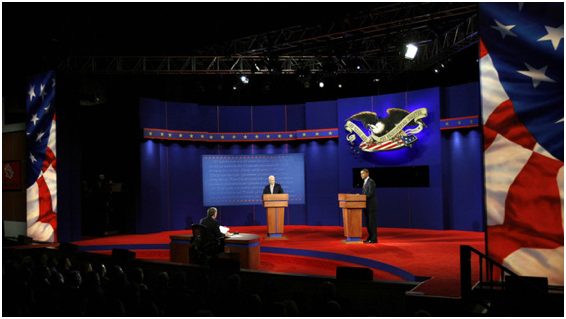The Super Bowl of Electoral Politics
9 p.m. EST Wednesday night. Grab your popcorn and plop down in front of the television, because I hear the networks are carrying it. The presidential debates. It’s the Super Bowl of electoral politics. And boy, am I excited.
Romney’s series of gaffes and his subsequent slip in the polls has granted political pundits and network executives the license to raise the stakes of the customary 90 minutes mildly contentious conversation to an event that is going to determine the fate of the free world. According to expectations: Mitt Romney needs to take the Mile-High City by storm. He’s floundering in polls, and if there is any opportunity for him to right his wrongs, cap the leak, repair the hull, put out the fire, make it through the wave, finish the race, bring it home, crack the crab, repel the alien invasion, etc. he must do it on Wednesday night.
Mr. Obama on the other hand, is thought clearly the stronger candidate and must show it. He has to destroy Romney. No one wants a weak president, after all.
I’m glad pundits are having so much fun with their scenarios, but let’s be honest, there’s a reason they didn’t stick with creative writing. The truth: The debate provides a unique opportunity to size up the president and his challenger. Conventions are great. Voters got to see which side had a better cheerleading squad, but at the end of the day, neither side said anything whatsoever of substance (with the exception of Bill Clinton’s exceptional speech). They were about the candidate’s character and “vision”.
But in this debate the candidates face a few bumps in the road to their current strategies. First, Jim Lehrer is a veteran reporter, and one who can ask the hard follow-up. He may not be content with the president’s “turn the corner” mentality, nor Romney’s mythical 12 million jobs. Second, the candidates both seek to profit from pinning their opponents to policy specifics. If Obama can clearly outline the severity of Romney’s budget cuts, or, likewise, if Romney can tie the president to some of his broken promises, their attacks will resonate. Voters are more likely to remember the concrete attacks rather than ideological wish-wash.
Which brings up the most important issue of all. Voters, but really television viewers, aren’t going to sit through 90 minutes of ideological babble and talking points. It says nothing new about the candidates, and it certainly makes for bad television. If these candidates want to breakthrough the tube, this is their chance. So who benefits from the fact based debate? Short answer: Romney.
Mitt Romney is at his worst when he’s selling the ideological conservative. Because he’s not an ideological conservative. I don’t know when Mitt Romney is at his best since I haven’t seen it, but based on the testament of close friends, advisors, and former Bain colleagues, it’s when he critically looks at issues and makes rational decisions. In providing a venue for specifics, the debate gives Romney a chance to show his pragmatic, problem-solving side. Considering his convention speech and the “47 percent” video are his most visible moments, highlighting the rational Mitt is paramount.
The Romney campaign’s biggest lament is that voters don’t know him. That really he’s a great problem solver. The debate is the campaign's best opportunity to actually show that skill and let people see the “real” Mitt. Stump speeches require hoo-raying, debates require practicality in dealing with opponents.
When voters see the “true” debate Romney, when they see he isn’t actually a kook, but a rational person, they’ll feel better about him as president. And that doesn’t require prep or facade. It will be natural for Romney and he will challenge voters’ current conceptions of him. President Obama will not. He’s a known entity and goes into the debate with high likability ratings. Touting a small lead, many expect him to seal the deal in the first presidential debate. He won’t.
The president needs to do what he’s been trying to do throughout the election. Reassure voters that things are in the process of getting better, and that Mitt Romney is a bad candidate and would be a terrible president. These are both effective arguments, but neither are new and it remains to be seen if they will be effective now. Maybe he’ll make the case better Wednesday, but the task is certainly harder than Romney’s.
Wednesday will be fun and anticlimactic for most of America. But it is important. So watch it. You might see some history.

